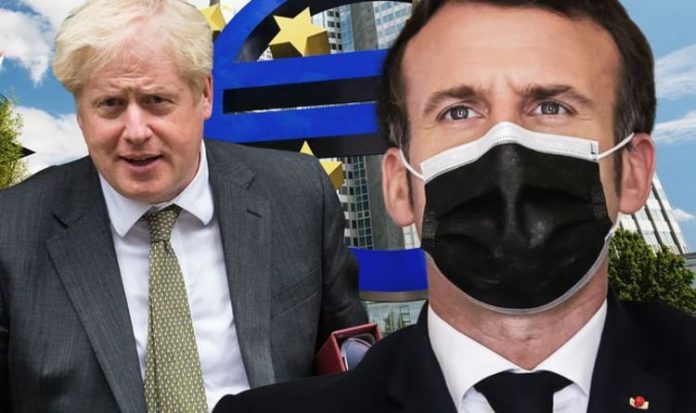The UK and EU have agreed to extend the time for approval of the Brexit trade deal forged by Prime Minister Boris Johnson and Brussels counterparts in December. While the deal was ratified in one day on December 30, it was only provisionally implemented as the European Parliament needed more time to go over the agreement. Cabinet Office Minister Michael Gove said this week: “Provisionally applying the agreement was not the United Kingdom’s preferred outcome given the uncertainty it creates for individuals and businesses and indeed the parties. “Extending the period of provisional application prolongs that uncertainty.”
Mr Gove’s comments come as Brexit grievances over trade show no signs of waning.
British exporters and importers are furious as rules of origin for products that are imported into the UK, then exported to the EU cause difficulty for some firms.
French President Emmanuel Macron took a tough stance on trade during the Brexit talks, and even tried to freeze UK businesses out of £350billion’s worth of public contracts in the EU.
Mr Macron made the proposal, called the “buy European act”, and it threatened to exclude companies such as BT and Serco from carrying out work for EU institutions and member states.
The proposal, put forward in 2017, represented a stance that was much harsher than anything from the European Commission, which had previously pledged that it would “never advocate a buy European only policy”.
Mr Macron’s plan was met with backlash in the UK as Brexiteers called for retaliatory measures.
John Longworth, chairman of Leave Means Leave, and a former director-general of the British Chambers of Commerce, said: “The continental Europeans have been playing this game on procurement for a very long time. It’s about time we caught up.”
The French President’s proposal was also dismissed by Alister Maughan, a partner at Morrison Foerster.
He said: “A Buy Europe [act] would be difficult to square with the EU’s commitments under the WTO Government Procurement Agreement so I don’t see how it could ever be implemented.
“It’s a nice soundbite but not really practical.”
READ MORE: Brexit threatens EU unity: ‘Now we are alone with France!’
French lawmakers published a report in 2017 that suggested the UK must not have privileged access to EU markets once out of the bloc.
The French senate vowed that the UK must not be allowed to leave the EU in a better-off position than it was as a member state, and if necessary a withdrawal without an agreement had to be considered.
It also described a speech by former Prime Minister Theresa May as a “mixture of veiled threats and pledges of goodwill”.
The report admitted the UK economy had weathered the early Brexit storm, but said weaknesses would be exposed.
The French lawmakers said rising household debt, a weakening of the commercial real estate market, the current account deficit and the devaluation of sterling could impact the UK.







